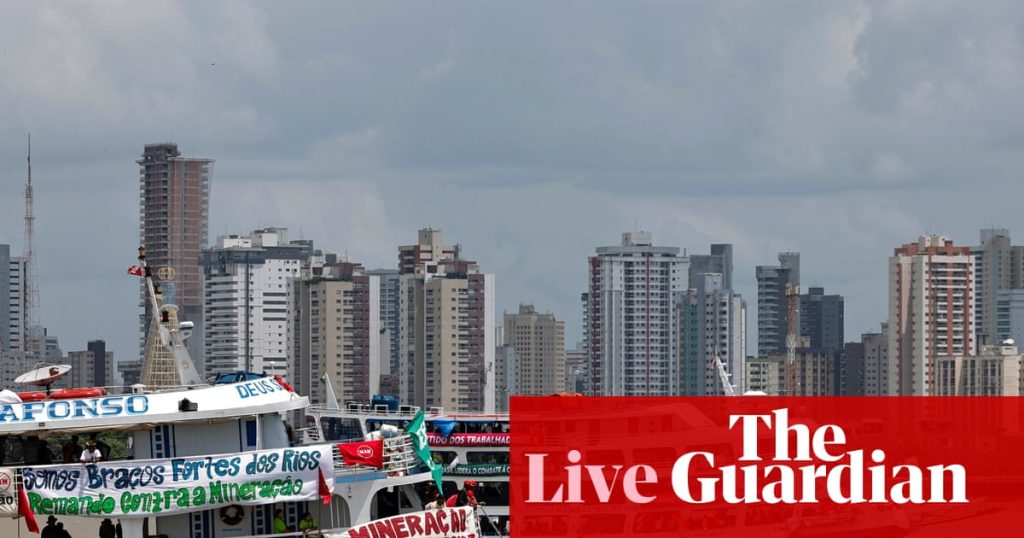Key events
Please turn on JavaScript to use this feature
Away from the official Cop30 negotiations, members of the Amazon’s indigenous communities were gathering in Belém’s university yesterday for the inauguration of a parallel People’s Summit.
Pictures filed by news agencies showed people dancing, singing and mingling at the event, on the grounds of the Federal University of Para, just a couple of miles from the conference centre where the UN climate summit is taking place.
The opening included small protests, singing and dancing, as well as speeches led by Indigenous communities from across the Amazon, according to a report by the Associated Press. “Here we are heard, here our voices are listened to,” Inés Antonia Santos Ribeiro, a professor at the university, was quoted as saying.
This year’s climate conference is the first being held in the Amazon rainforest, a symbolic choice by the host country, Brazil, in part to ensure that Indigenous peoples have a larger presence.
But some have nonetheless felt excluded from proceedings, frustrations which contributed to a fracas on Tuesday night when protesters tried to force their way in to the conference’s restricted, accredited delegates-only area.
Supporters of the protest used a press conference at the People’s Summit to defend the action, saying it was aimed at demonstrating the desperation of their fight for forest protection, according to a report by Reuters.
“It was an attempt to get the attention of the government and the U.N. that are in this space,” Auricelia, a member of the Arapiun community, was quoted as saying by the agency. The Arapiun are native to the region where Belém is located.
Joao Santiago, a professor at the Federal University of Para, was quoted as saying by AFP: “The Indigenous movement wanted to present its demands inside the blue zone but were not allowed in.”
Organised in parallel with the Cop30 summit, the People’s Summit is taking place from 12 to 16 November. Over the next two days, plenaries will be held to draft a letter to be delivered to the Cop 30 president André Corrêa do Lago, and submitted to conference delegates.
Then on Saturday it will be the starting point of a Global March for Climate Justice Now, with at least 15,000 people expected to take part.
Share
This is Damien Gayle here, anchoring the Guardian’s Cop30 liveblog for the first half of the day. Belem is three hours behind, so it’s about 9am there and things are just starting to get going for the day.
If you have any suggestions for things taking place in Belém that you think we ought to be covering, then please do drop me a line at damien.gayle@theguardian.com.
Share
Signs of gradual progress as developing countries call for just transition

Oliver Milman
There was a see-sawing element yesterday in Belem, between optimism and pessimism that we will ever crack this climate problem, writes Oliver Milman, environment reporter for Guardian US.
On one hand, the world is still failing badly to contain dangerous global heating, albeit not as badly as we were failing 10 years ago. The Climate Action Tracker report released overnight shows the planet is on course for a 2.6C temperature rise this century despite a flurry of new climate plans from governments, a scenario that would deny generations a world with functional agriculture, stable coastlines and non-lethal heat.
Countries are still drilling for oil and gas and burning it in vast quantities, despite promising to start kicking the habit. They are being egged on by the most powerful office in the world, the US presidency, despite an American absence here in Belem.
But yesterday also brought signs of progress, or at least hope. Developing countries, in the form of the G77 and China, called for a “just transition mechanism” to coordinate finance and help countries move towards a low-carbon future.
The UK won the unwanted “fossil of the day” award from climate activists for dismissing the need for the new mechanism and insisting that a just transition should remain a domestic issue.
Meanwhile, appropriately for a summit that has been called the “Cop of Truth” by Brazil’s president, 12 countries demanded governments, business and academia promote accurate information on the climate crisis and fight off climate denialism and attacks on science and journalism. It’s the first time such a move has been made against climate disinformation.
The larger, tectonic trends can look promising, too, if you squint a bit. Despite the backlash underway in the US, renewables will globally grow faster than any other type of energy in the next decade and will make the shift from fossil fuels “inevitable”, a major International Energy Agency report yesterday found.
We are getting there. If you can’t run, then walk or crawl as long as you’re moving forward, as Martin Luther King once reminded us. It would be helpful if the pace was picked up somewhat, though, which is something that activists will remind negotiators today in a series of different events and protests, including a call to halt oil drilling near here, at the mouth of the Amazon.
The “people’s summit” will be in full swing today, following the arrival of 200 vessels with 5,000 people aboard yesterday, calling for a just transition, an embrace of Indigenous rights and a rejection of half-measures. It will be another day of fluctuating moods in sweltering Belem.
Share

